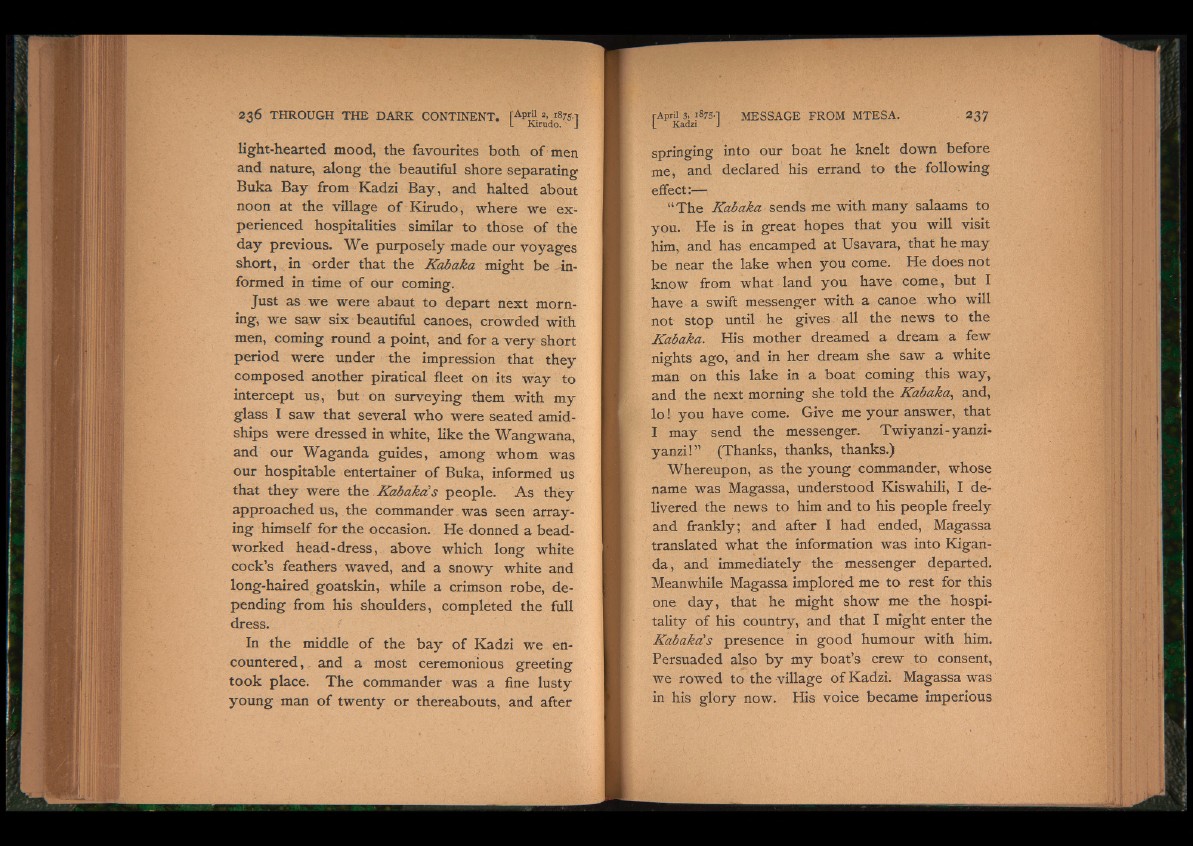
light-hearted mood, the favourites both o f men
and nature, along the beautiful shore separating
Buka B a y from Kadzi B a y , and halted about
noon at the village o f Kirudo, where we e x perienced
hospitalities similar to those o f thè
d ay previous. W e purposely made our voy ag es
short, J n order that the Kabaka might be -informed
in time o f our coming.
Just as we were abaut to depart next morning,
we saw s ix beautiful canoes, crowded with
men, coming round a point, and for a v e r y short
period were under the impression that they
composed another piratical fleet on its w a y to
intercept us, but on surveying them with my
glass I saw that several who were seated amidships
were dressed in white, like the Wangwana,
and our Waganda guides, among whom was
our hospitable entertainer o f Buka, informed us
that th e y were the Kabaka!s people. A s they
approached us, the commander was seen arraying
himself for the occasion. He donned a bead-
worked head-dress, above which long white
co ck ’s feathers waved, and a snowy white and
long-haired goatskin, while a crimson robe, depending
from his shoulders, completed the full
dress.
In the middle o f the b a y o f Kadzi we encountered,
and a most ceremonious greeting
to o k place. T h e commander was a fine lusty
yo u n g man o f twenty or thereabouts, and after
rApril 3, j875/1 MESSAGE FROM MTESA. 2 3 7
I Kadzi J
springing into our boat he knelt down before
me* and declared his errand to the following
effect:—
“ The Kabaka sends me with many salaams to
you. He is in great hopes that yo u will visit
him, and has encamped at Usavara, that he may
be near the lake when yo u come. He does not
know from what land yo u have come, but I
have a swift messenger with a canoe who will
not stop until he gives all the news to the
Kabaka. His mother dreamed a dream a few
nights ago, and in her dream she saw a white
rnqn on this lake in a boat coming this w a y ,
and the next morning she told the Kabaka, and,
lo! yo u have come. Give me yo u r answer, that
I may send the messenger. Twiyanzi-yanzi-
yanzi!” (Thanks, thanks, thanks.)
Whereupon, as the young commander, whose
name was Magassa, understood Kiswahili, I delivered
the news to him and to his people freely
and frankly; and after I had ended, Magassa
translated what the information was into Kigan-
da, and immediately the messenger departed.
Meanwhile Magassa implored me to rest for this
one d a y , that he might show me the hospitality
o f his country, and that I might enter the
Kabakcis presence in good humour with him.
Persuaded also b y my boat’s crew to consent,
we rowed to the village o f Kadzi. Magassa was
in his g lo ry now. His voice became imperious